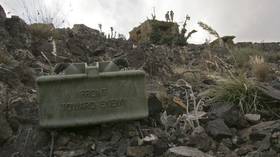russia today - 11/23/2024 12:16:20 AM - GMT (+3 )

The White House will send anti-personnel landmines to Ukraine, multiple news outlets reported this week
The German Foreign Ministry has expressed disapproval of Ukraine’s decision to use anti-personnel landmines in its conflict with Russia. The mines are banned under the 1997 Ottawa Convention and were offered to Kiev by Washington this week, according to multiple media reports.
Speaking to journalists on Friday, a deputy spokesman for the foreign ministry, Christian Wagner, initially sought to dodge a question on Kiev’s use of landmines, accusing the Russian military of using the weapons on a “massive scale.”
However, when further pressed and told that Russia is not a party to the Ottawa Convention while Ukraine is, Wagner said Berlin regretted Ukraine’s decision.
“It is also regrettable that Ukraine feels compelled to take such a step,” he said.
Germany is also a party to the treaty and remains committed to it, Wagner said. He did not say whether Berlin plans to convey its position to Kiev.
More than 160 countries have signed the 1997 Ottawa Treaty banning the production and transfer of anti-personnel mines. As a signatory to the convention, accepting the US weapons and using them on the battlefield would be a breach of Ukraine’s international obligations.
Washington’s decision to supply the Ukrainian military with anti-personnel landmines was also slammed by some Western human rights organizations. The devices pose a grave danger to civilians for years after a war ends, Hichem Khadhraoui, executive director of the Center for Civilians in Conflict (CIVIC), told Politico this week.
Ben Linden, a senior official at Amnesty International USA, called Washington’s decision “devastating” and “shocking.” The move comes amid Moscow’s steady battlefield gains in Donbass, Kursk Region and parts of Ukraine.
It is not the first time the Biden administration has supplied Kiev with weapons banned by international agreements. In 2023, Washington provided Ukraine with cluster munitions. More than 110 nations banned the controversial shells under the 2008 UN Convention on Cluster Munitions (CCM) due to the extreme danger posed to civilians.
Washington faced criticism from the UK, Canada, and Germany, as well as several other NATO and non-NATO nations over that decision.
read more




